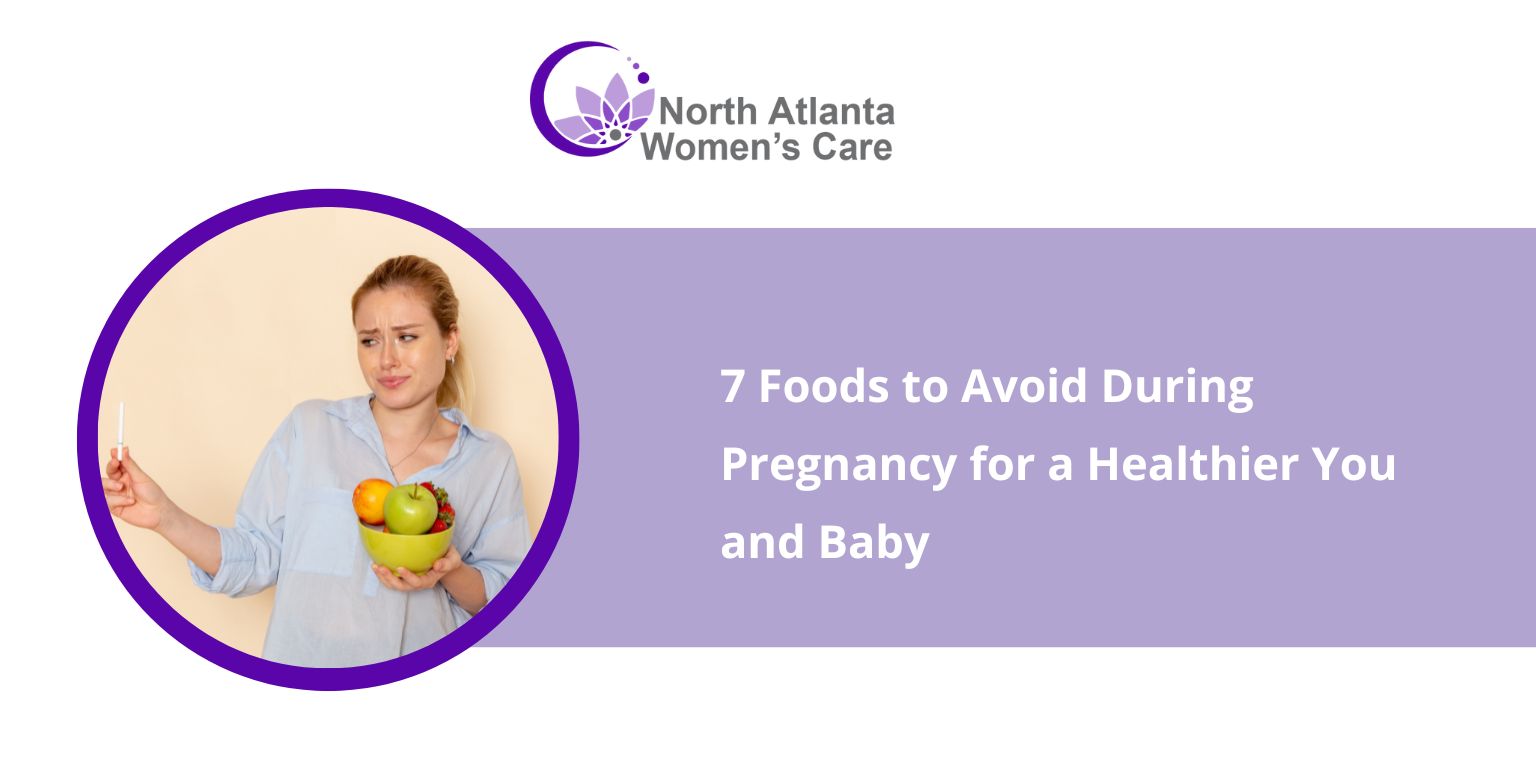7 Foods to Avoid During Pregnancy for a Healthier You and Baby

Pregnancy is an exciting journey, but it also comes with important dietary considerations. A balanced pregnancy diet is essential for the well-being of both mother and baby. Consuming unsafe foods can lead to complications, making it crucial to know what to avoid. In this blog, we will highlight seven foods to steer clear of and provide tips for crafting a safe pregnancy meal plan.
Why Your Pregnancy Diet Matters?
Good nutrition during pregnancy supports the growth and development of your baby while keeping you healthy. A well-planned pregnancy diet ensures you receive essential nutrients like folic acid, iron, calcium, and protein.
When planning your meals, focus on whole, nutrient-dense foods. Avoid ingredients that may harm your baby’s development.
The 7 Foods to Avoid During Pregnancy
There are certain food items that you should avoid during pregnancy.
1. Raw or Undercooked Meat
Raw or undercooked meat may harbor bacteria like Salmonella and E. coli, increasing the risk of foodborne illnesses.
Safe Alternatives: Opt for fully cooked meat. Use a food thermometer to ensure an internal temperature of 165°F for poultry and 145°F for other meats.
2. Unpasteurized Dairy Products
Unpasteurized milk, cheese, and yogurt can contain Listeria, a bacterium harmful to pregnant women.
Safe Alternatives: Choose pasteurized dairy products such as cheddar, mozzarella, and Greek yogurt.
3. Certain Types of Fish
Fish high in mercury, such as shark, swordfish, and king mackerel, can harm your baby’s developing nervous system.
Safe Choices: Enjoy low-mercury options like salmon, cod, and sardines. Aim for two servings of fish per week.
4. Raw or Undercooked Eggs
Raw or partially cooked eggs may carry Salmonella, which can cause severe food poisoning.
Safe Tips: Cook eggs until the whites and yolks are firm. Avoid dishes like homemade mayonnaise or raw cookie dough.
5. Caffeine in Excess
High caffeine intake may affect fetal development and increase the risk of low birth weight.
Safe Limit: Limit caffeine to 200 mg per day (about one 12-ounce cup of coffee).
6. Alcohol
Drinking alcohol during pregnancy can lead to Fetal Alcohol Syndrome and developmental issues.
Alternatives: Opt for non-alcoholic beverages such as sparkling water or mocktails.
7. Processed and Junk Foods
Processed snacks and junk foods are high in salt, sugar, and unhealthy fats, which may contribute to excessive weight gain and gestational diabetes.
Healthy Swaps: Snack on fresh fruits, nuts, and whole-grain crackers instead.
Safe and Balanced Pregnancy Meal Plan
Maintaining a nutritious diet during pregnancy is essential for supporting your baby’s development and keeping you healthy. Here are some general tips and a sample meal plan that may suit most pregnant women. However, always consult healthcare professionals before making significant dietary changes to ensure your unique needs are met.
Quick Tips for Meal Planning
- Include a variety of lean proteins, whole grains, fruits, vegetables, and healthy fats in your meals to meet your nutritional needs.
- Stay hydrated by drinking plenty of water throughout the day.
- Avoid skipping meals and incorporate small, balanced snacks to keep your energy levels steady.
- Limit sugary, processed, or high-fat foods and prioritize nutrient-dense options.
Sample Daily Meal Plan
- Breakfast: Scrambled eggs served with whole-grain toast and avocado slices.
- Snack (Post Breakfast): A bowl of Greek yogurt topped with fresh berries.
- Lunch: Grilled salmon accompanied by quinoa and steamed broccoli.
- Snack (Post Lunch): Sliced apple with almond butter.
- Dinner: Chicken stir-fry made with colorful mixed vegetables and brown rice.
- Dessert: A small piece of dark chocolate for a sweet, guilt-free treat.
This meal plan is designed to provide a balance of essential nutrients, but every pregnancy is unique. For personalized dietary guidance, consult our healthcare experts.
Consult Our Experts for the Best Pregnancy Diet Plan
A safe and balanced pregnancy diet is essential for your health and your baby’s development. Avoiding unsafe foods such as raw meat, unpasteurized dairy, and high-mercury fish can significantly reduce potential risks. Creating a diet that includes nutrient-rich and safe options can make a lasting impact on your baby’s growth and your overall well-being.
Need help crafting the perfect pregnancy meal plan? Consult our experts at North Atlanta Women's Care for the best pregnancy diet plan. Your health and your baby’s well-being are worth every effort.
Frequently Asked Questions
1. Can I eat sushi while pregnant?
You can enjoy sushi made with fully cooked fish or vegetarian options. Avoid raw fish and shellfish.
2. How much caffeine is safe during pregnancy?
Limit caffeine to 200 mg per day to minimize risks.
3. Are herbal teas safe?
Not all herbal teas are safe during pregnancy. Consult your healthcare provider before consuming herbal products.
Comments are closed

